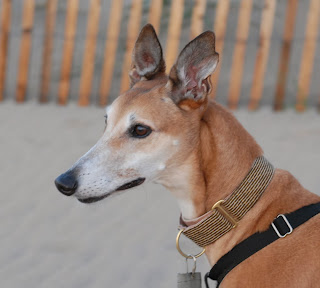Monday, December 23, 2013
Thursday, December 12, 2013
Millionaire Greyhound Breeder Asks for More Subsidies
 |
| Millionaire greyhound breeder Brad Boeckenstedt, Photo by the NGA |
The law also requires that dog races be subsidized with millions of dollars in gambling profits each year; funds that could instead be used for state programs. In Dubuque, these funds would otherwise go to local non-profit organizations.
To defend their subsidies, greyhound breeders turned to kennel owner Brad Boeckenstedt, who told a local reporter:
"Our family is greatly invested in our community and in the greyhound business ... It's kind of sad that they want to get rid of us now that they have slots."The irony here is incredible. The fact is, Brad Boeckenstedt is a perfect example of the problem. Just since 2009, his kennel has received at least $4.75 million dollars in purse payments. Virtually all of these funds come from subsidy dollars. Also, that total does not include some subsidy payments from 2010 that the state no longer has records for. Last year alone, Boeckenstedt received $1.26 million in purse subsidy payments.
This is what the debate in Iowa has come to: a handful of greyhound breeders receiving millions in subsidies. Their spokesman for this bad public policy is the top recipient of subsidy dollars, a multi-millionaire greyhound breeder. Brad Boeckenstedt claims that he has "invested in our community," but in reality the state of Iowa has repeatedly invested in him, paying him millions for an activity that is no longer viable.
It's time for the gravy train to end. Next Spring, lawmakers should put an end to these subsidy payments for millionaire greyhound breeders.
Tuesday, December 10, 2013
New Zealand Dog Track Official: Animal Welfare Means Digging a Good Death Pit
 |
| A New Zealand greyhound death pit, image by Farmwatch |
In part, Kerr wrote that while "dealing with the disposal of your animal can be very unpleasant" it is "necessary." He went on to remind greyhound trainers of the factors they need to consider when burying dead greyhounds:
"Regardless of the method of disposal you choose, make certain you have all the facts and information first before proceeding. Always be aware of wells, surface water, public areas and property lines. Also consider if seasonal water will be an issue: often different times of year will cause the water table to rise."Kerr added that trainers must take local wildlife into account in disposing of their dead greyhounds:
"If composting or burying, take steps to ensure wildlife or other animals on your property cannot access the carcass."Kerr also told greyhound trainers that when burying their dead greyhounds, they should think about what season it is:
On Track Magazine is the "official information bulletin" of Greyhound Racing New Zealand (GRNZ), and this essay appeared under the header "welfare news." In fact, Kerr is the official "Animal Welfare Manager" for the industry.
"Consider your options well in advance, and make plans for different seasons: for example it may be impossible to bury a carcass during the winter months due to frozen ground and high water tables."
This is not the first example of the New Zealand dog racing industry using death pits. Just a few weeks ago, news program 3rd Degree reported on a greyhound death pit that was found on the property of GRNZ Board Member Phil Green. Their reported followed an investigation by the Greyhound Protection League of New Zealand and Farmwatch. When he was caught, Green was the chair of the industry's supposed animal welfare committee. He has since resigned his position.
It's clear that for Greyhound Racing New Zealand, animal welfare means little more than being thoughtful when burying your dead greyhounds. In his essay, Kerr actually claimed that the advice he was giving was a way of showing greyhounds "dignity and respect." He wrote:
Rather than focus on digging good death pits, the New Zealand dog racing industry should begin showing greyhounds a little dignity while they are still alive.
"Carcasses should be disposed of immediately, and treated with the dignity and respect they deserve."
Thursday, December 5, 2013
Fourth Dog Track Worker in West Virginia is Disciplined for Greyhound Abuse
 |
| Tucker raced at Mardi Gras dog track in West Virginia |
"Fisher was observed showing inappropriate behavior to a greyhound by pulling on the collar and pushing the greyhound's head down in a rough manner."During a state hearing on the incident, Fischer admitted to the incident and stated that he "was having a bad day." The incident occurred at Mardi Gras dog track.
This is the fourth time this year that a West Virginia dog track worker has been suspended or had his license revoked due to greyhound neglect or cruelty. Two individuals were sanctioned after an incident in March in which a greyhound named Kiowa Dutch Girl suffered a broken leg and was denied veterinary care. In April, an assistant greyhound trainer at Wheeling Island dog track was caught on surveillance video hitting two greyhounds.
The West Virginia Racing Commission should be applauded for addressing this issue, and taking action in these cases. It does raise questions, however, about the continued operation of dog racing in West Virginia. These are no longer isolated incidents, but instead represent a pattern of animal cruelty and neglect.
Subscribe to:
Posts (Atom)

